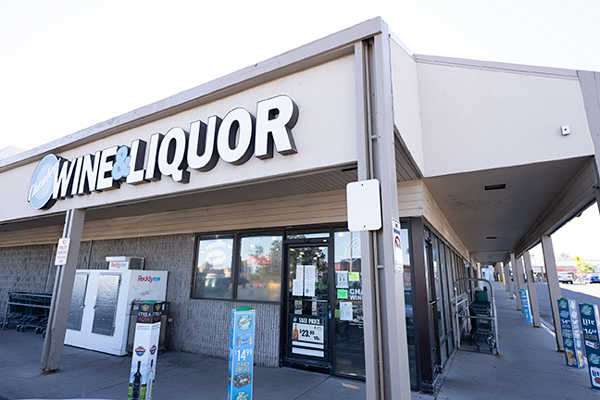
Photo by PHILIP B. POSTON/Sentinel Colorado
AURORA | Despite a pandemic and accompanying economic plunge, Aurora sales tax collections have improved in 2020 compared to the first eight months of 2019. Advocates say that’s a sign of resilience in the local economy, but for many small business owners, the future remains grim.
This year, city officials tallied more than $140 million in sales taxes collected across all industries through 2020. That’s almost $5 million higher than the same period in 2019, and a surprise for city budget planners projecting shortfalls.
It’s a trend driven by promising economic activity this summer, according to the city’s figures.
The general uptick in sales taxes outstrip pessimistic projections made by city budget officials after public health authorities and Gov. Jared Polis restricted business activity in March — part of efforts to help contain COVID-19, but measures that decimated restaurants in particular.
The city collects sales taxes from a business when a resident purchases a good or service. Originally, planners at the city budget office estimated a 5% decline in sales taxes for all of 2020 as consumers limit their spending over fears of the novel coronavirus or to save money during a recession.
With fall approaching and hospitalizations rising due to COVID-19, it’s still possible that the city will see an overall decline in sales tax revenue by year’s end.
Plus, city officials attributed much of the sales tax uptick to a small number of booming businesses.
One firm selling internet technology business solutions reported the largest-ever sales tax contribution of $1.7 million, according to Abraham Morales, a city spokesperson. He said city analysts assumed the windfall was driven by companies seeking out remote-work solutions.
Even so, officials and business advocates welcomed the current sales tax figures in the midst of planned budget cuts and revenue shortfalls. Sales taxes are a critical part of the city budget, representing the largest share of the city’s $360 million general fund.
The sales tax figures also suggest customers bought local this summer and many businesses are staying open, said Kevin Hougen, president of the Aurora Chamber of Commerce.
However, he said consumers have shifted their buying habits and created stark disparities for local businesses.
“Certain clusters are really doing well, and others are going to have a really hard year going into 2021,” Hougen said.
Online retailers with a foothold in Aurora are doing well, he said, as residents “learn to like” skipping the trip to a brick-and-mortar store. They’re opting instead to surf the web.
However, the city has been able to capture some sales tax revenues. That’s in part because a city ordinance went into effect last month requiring online retailers to collect local sales taxes. The city also collects sales tax revenues from businesses in Aurora with an online presence, such as a Amazon or Walmart, said city tax and licensing manager Trevor Vaughn.
Winners in the post-COVID-19 economy also include beer and liquor stores.
In this sector, sales taxes are higher so far this year. These stores contributed about $600,000 more in sales taxes than in the first eight months of 2019.
At Chambers Wine and Liquor, near the intersection of East Iliff Avenue and South Chambers Road, business is leveling off somewhat, said owner Lee Earnhart.
He said the store was busy in the early days of the pandemic — especially when people were afraid that governments would shut down liquor stores and leave the region dry. Bars have remained under capacity restrictions at the behest of local public health authorities and Polis.
Earnhart said the arrangement is “fortunate for us, unfortunate for other owners.”
He emphasized that the future is uncertain.
“What scares me is if another (COVID-19) wave hits when it gets cold,” he said.
Compared to the same period last year, discount stores as well as businesses selling computers, electronics and building materials have all contributed more sales taxes, according to the city’s figures.
That includes grocery stores. Hougen said he’s hearing that major grocery outlets including Walmart and Sam’s Club have seen a flurry of business during the “new normal.”
Meanwhile, restaurants and “mom and pop” establishments are struggling, said Chance Horiuchi, executive director of the Havana Business Improvement District.
“Eating and drinking” establishment losses topped all sectors’ declines in sales tax contributions, according to the city. Those businesses accounted for $2.6 million less in sales taxes so far in 2020 compared to the first eight months of 2019.
Hannah Cho is one business owner feeling the squeeze.
Born in South Korea, Cho earned a finance degree and renovates houses for sale. She also owns Shin Myung Gwan Korean BBQ, located near the intersection of East Yale Avenue and South Havana Street.
Cho said business has improved somewhat in recent months, but not enough. She still only tops out at 70% of their usual revenue, she said.
“It’s not enough, and it’s not there yet,” she said.
Cho has been buoyed by the $1 million Aurora Economic Relief program. But she said the help isn’t enough. She had to lay off an employee — a miserable experience because she’s staffed her restaurant with family members, to give them work — and borrow against the value of her properties.
She said her situation is better than other establishments, but she’s trying to keep her community employed.
Horiuchi said, barring more assistance from some level of government, passers-by will begin to see boarded-up windows on Havana Street. So far, the commerce corridor is still seeing rising sales tax figures, and business lots remain almost 100% occupied because of government help.
“The reality is, they need more. So I’m hoping that Congress and city and state (government) can find some more money for local businesses,” she said.
A second round of federal CARES Act dollars stalled in Congress this summer.
Hougen said local governments should ease business restrictions to help owners and workers survive as winter approaches.

